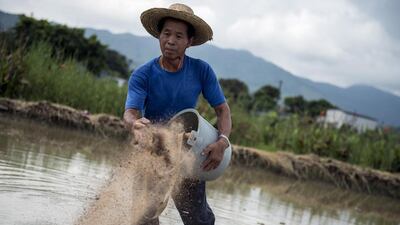HONG KONG // It’s a rural tradition that faded out decades ago as Hong Kong turned into a neon-lit megacity – rice seedlings being dropped into watery paddy fields with gentle plops.
But now a new wave of farmers are growing the staple again in sleepy Long Valley in the city’s northern New Territories, where buzzing insects and flocking birds offer a rich contrast to the high rise blocks in the distance.
Former supermarket supervisor Kan Wai-hong went from working late shifts to harvesting sacks of fragrant, golden rice.
“In the past people in Hong Kong grew rice,” said Mr Kan, 42, about his move. “I could teach the people again and revive rice farming.”
The naturally-farmed rice paddies started reappearing in Long Valley seven years ago after more than 40 years’ absence.
Started as part of a bird-friendly wetland conservation project, five farmers now produce around three tonnes of rice a year near the border with Hong Kong’s biggest food supplier mainland China.
It is a mere drop in the 833 tonnes of rice that Hong Kong goes through every day, but it fetches several times the price of mass-produced imports as part of a growing demand for naturally grown food.
A relentless run of food scandals across the border – from rotten meat in fast-food to dead pigs floating in rivers, recycled “gutter oil”, and heavy pesticide use – has made people rethink the way they shop.
“When food safety in mainland China or even other places is not that good, then Hong Kong people will choose foods that are safer,” said Mr Kan.
“The trend of society has changed, people have become more affluent and they care more about food safety,” he said of the more expensive organic fare.
Hong Kong imports nearly all of its food with just two per cent of its vegetables locally grown.
But the number of organic-style vegetable farms has increased from a handful in the 1990s to several hundred today.
Homegrown organic vegetables now make up 12 per cent of the 45 tonnes of vegetables the city produces daily.
Shoppers are shrugging off the fact that they cost more than their mass produced counterparts.
“After learning that there are quite a lot of different kinds of pesticides or different ways of growing the plants, I think it’s better to have the organic ones,” Jenny Ho said while browsing one of several weekly organic markets.
Despite the shock of a 2008 melamine-laced baby formula scandal that killed six infants, China’s food scares have continued to flare.
Among the latest scandals to fuel distrust are chicken feet soaked in hydrogen peroxide and a cook who painted dishes with a banned pigment to look more appealing.
Last month new rules on pesticide residues came into effect. But apprehension remains.
“Food supply in Hong Kong is still safe but we worry,” Jonathan Wong, director of the Hong Kong Organic Resource Centre said, blaming the regular mainland scandals. “This psychologically makes people in Hong Kong feel worried about the food supply from China.”
By 1980, 40 percent of farmland in Hong Kong was reported as abandoned and rice paddies made up less than one per cent of what was in use. Today, a total of just seven square kilometres is actively farmed.
But shrinking farmland is often limited to small plots on short-term leases in the space-challenged city, which is also home to rooftop vegetable gardens and vertical fish farms.
Farmer Thomas Fung lives in Hong Kong’s skyscraper sprawl and commutes to his New Territories patchwork of plots rented from six different landlords.
“The people are quite afraid of the quality of mainland China veggies, so the demand is very, very big in Hong Kong,” said Mr Fung, who acknowledges that the fears play to the favour of organic farmers.
* Agence France-Presse

